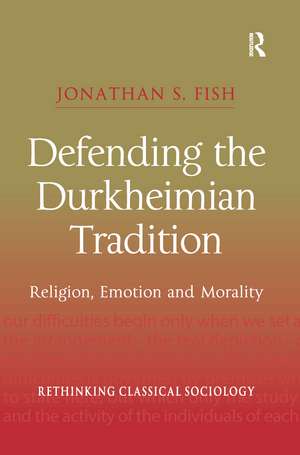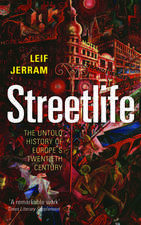Defending the Durkheimian Tradition: Religion, Emotion and Morality: Rethinking Classical Sociology
Autor Jonathan S. Fishen Limba Engleză Paperback – 30 iun 2020
| Toate formatele și edițiile | Preț | Express |
|---|---|---|
| Paperback (1) | 389.66 lei 6-8 săpt. | |
| Taylor & Francis – 30 iun 2020 | 389.66 lei 6-8 săpt. | |
| Hardback (1) | 1000.27 lei 6-8 săpt. | |
| Taylor & Francis – 28 aug 2005 | 1000.27 lei 6-8 săpt. |
Preț: 389.66 lei
Nou
Puncte Express: 584
Preț estimativ în valută:
74.56€ • 78.05$ • 62.06£
74.56€ • 78.05$ • 62.06£
Carte tipărită la comandă
Livrare economică 31 martie-14 aprilie
Preluare comenzi: 021 569.72.76
Specificații
ISBN-13: 9780367604356
ISBN-10: 0367604353
Pagini: 216
Dimensiuni: 156 x 234 x 12 mm
Greutate: 0.31 kg
Ediția:1
Editura: Taylor & Francis
Colecția Routledge
Seria Rethinking Classical Sociology
Locul publicării:Oxford, United Kingdom
ISBN-10: 0367604353
Pagini: 216
Dimensiuni: 156 x 234 x 12 mm
Greutate: 0.31 kg
Ediția:1
Editura: Taylor & Francis
Colecția Routledge
Seria Rethinking Classical Sociology
Locul publicării:Oxford, United Kingdom
Cuprins
Contents: Setting the scene; Émile Durkheim's The Elementary Forms of Religious Life; Émile Durkheim's lectures on Moral Education; Émile Durkheim's lectures on Professional Ethics and Civic Morals; Émile Durkheim's The Division of Labour in Society and The Two Laws of Penal Evolution; Talcott Parsons's The Structure of Social Action; Talcott Parsons's post-war writings on religion; Jean Baudrillard's 'implosive' critique of the Durkheimian tradition; Stjepan Meštrovic's and Michel Maffesoli's 'implosive' defence of the Durkheimian tradition; Conclusion; Bibliography; Index.
Notă biografică
Jonathan Fish is at the School of Sociology and Social Policy at the University of Leeds, UK.
Recenzii
’This book offers an important and timely restatement of the rich potentialities of the Durkheimian tradition for contemporary sociologists and social theorists. Not only is his explication of Durkheim’s key arguments detailed and sensitive to its nuances, but Fish's account of Parsons's work makes a significant contribution to the current reassessment of this remoulding of the Durkheimian project. Fish's discussion of the resurgence of, and opposition to, Durkheimian currents in postmodern thought is also helpful and informative. This will be a very useful text for students in sociology and social theory, and should be of considerable interest to other writers in the field.’ Philip A. Mellor, University of Leeds, UK ’This ambitious book goes to the heart of contemporary neo-Durkheimianism. Encounters with Maffesoli, Mestrovic and Baudrillard enable the retrieval of an entire tradition formerly mired in rationalism and scientism. Even Talcott Parsons emerges from the rationalistic shadows. The new emotion-centred, religious sociology of Durkheim that is reclaimed here will set the tone for the next phase of Durkheim scholarship.’ Richard Kilminster, University of Leeds, UK
Descriere
Making an important contribution both to studies of Durkheim and the Durkheimian tradition and to the sociology of emotion, this book is distinctive in arguing that religion is an essential backdrop for understanding emotion. In making this claim Jonathan Fish provides a key to re-establishing links between the sociology of religion and the wider d
















